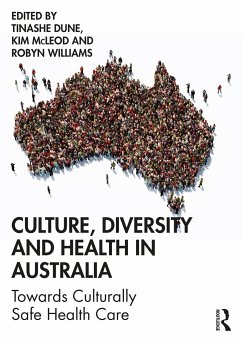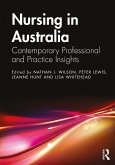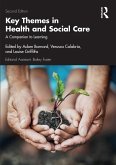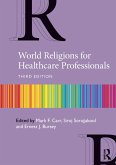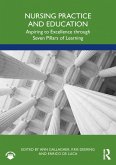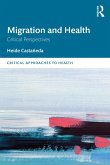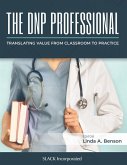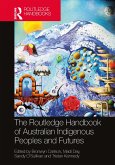Culture, Diversity and Health in Australia
Towards Culturally Safe Health Care
Herausgeber: Dune, Tinashe; Williams, Robyn; Mcleod, Kim
Culture, Diversity and Health in Australia
Towards Culturally Safe Health Care
Herausgeber: Dune, Tinashe; Williams, Robyn; Mcleod, Kim
- Broschiertes Buch
- Merkliste
- Auf die Merkliste
- Bewerten Bewerten
- Teilen
- Produkt teilen
- Produkterinnerung
- Produkterinnerung
This text, drawing on experts from a range of disciplines including public health, nursing and sociology, shows how the theory and practice of cultural safety can inform effective health care practices with all kinds of diverse populations.
Andere Kunden interessierten sich auch für
![Nursing in Australia Nursing in Australia]() Nursing in Australia29,99 €
Nursing in Australia29,99 €![Key Themes in Health and Social Care Key Themes in Health and Social Care]() Key Themes in Health and Social Care37,99 €
Key Themes in Health and Social Care37,99 €![World Religions for Healthcare Professionals World Religions for Healthcare Professionals]() World Religions for Healthcare Professionals49,99 €
World Religions for Healthcare Professionals49,99 €![Nursing Practice and Education Nursing Practice and Education]() Nursing Practice and Education39,99 €
Nursing Practice and Education39,99 €![Migration and Health Migration and Health]() Heide CastañedaMigration and Health42,99 €
Heide CastañedaMigration and Health42,99 €![The DNP Professional The DNP Professional]() Linda BensonThe DNP Professional82,99 €
Linda BensonThe DNP Professional82,99 €![The Routledge Handbook of Australian Indigenous Peoples and Futures The Routledge Handbook of Australian Indigenous Peoples and Futures]() The Routledge Handbook of Australian Indigenous Peoples and Futures224,99 €
The Routledge Handbook of Australian Indigenous Peoples and Futures224,99 €-
-
-
This text, drawing on experts from a range of disciplines including public health, nursing and sociology, shows how the theory and practice of cultural safety can inform effective health care practices with all kinds of diverse populations.
Hinweis: Dieser Artikel kann nur an eine deutsche Lieferadresse ausgeliefert werden.
Hinweis: Dieser Artikel kann nur an eine deutsche Lieferadresse ausgeliefert werden.
Produktdetails
- Produktdetails
- Verlag: Allen & Unwin
- Seitenzahl: 300
- Erscheinungstermin: 31. Mai 2021
- Englisch
- Abmessung: 246mm x 174mm x 18mm
- Gewicht: 584g
- ISBN-13: 9781760527389
- ISBN-10: 1760527386
- Artikelnr.: 60040465
- Herstellerkennzeichnung
- Libri GmbH
- Europaallee 1
- 36244 Bad Hersfeld
- gpsr@libri.de
- Verlag: Allen & Unwin
- Seitenzahl: 300
- Erscheinungstermin: 31. Mai 2021
- Englisch
- Abmessung: 246mm x 174mm x 18mm
- Gewicht: 584g
- ISBN-13: 9781760527389
- ISBN-10: 1760527386
- Artikelnr.: 60040465
- Herstellerkennzeichnung
- Libri GmbH
- Europaallee 1
- 36244 Bad Hersfeld
- gpsr@libri.de
Tinashe Dune is a multi-award-winning Senior Lecturer in the areas of health sociology and public health and is also a clinical psychology registrar. At Western Sydney University Dr Dune teaches in the Interprofessional Health Science program. Her research and teaching focuses on marginalised populations. This includes the experiences of culturally and linguistically diverse people, those living with disability, ageing populations, LGBTIQ-identifying people and Indigenous populations. Dr Dune utilises mixed-methods approaches and interdisciplinary perspectives, which support multidimensional understandings of the lived experience, health outcomes and empowered ways to improve wellbeing. Kim McLeod is Senior Lecturer in the School of Social Sciences at the University of Tasmania. Kim is known for her expertise in philosophically informed and arts-based health research. Much of Kim's work explores the social change that contributes to health equity and population-level wellbeing. Kim's approach to understanding health as ongoing processes of change is presented in her single authored book, Wellbeing Machine: How Health Emerges from the Assemblages of Everyday Life. Kim brings a multidisciplinary approach to her research practice. She commonly collaborates with researchers from the Health Sciences, Humanities and Social Sciences on health-related research projects. Kim's teaching expertise is introducing health profession students to cultural safety and the social context of health. She leads collaborative research projects to explore best teaching practice in this area. Robyn Williams has nursing and education qualifications and has over 37 years of experience of working with Indigenous peoples, primarily in the Northern Territory but also all over Australia. Her fields of expertise include cultural safety, effective communication, curriculum development and program implementation, evaluation of community-based programs, and qualitative research in Indigenous and rural and remote health issues and culturally safe practitioners.
Part I: Understanding Culture, Diversity and Health 1.An Introduction to
Culture, Diversity and Health in Australia 2.The Social and Cultural
Determinants of Health 3.Cultural Models of Health and Health Care Part II:
Culturally Safe Health Care Practice 4.Principles of Cultural Safety
5.Policy and Advocacy in Culturally Diverse Health Care 6.Culturally Safe
Health Care Practice Part II: Working with Diverse Populations
7.Aboriginal and Torres Strait Islander Australians 8.Culturally and
Linguistically Diverse Australians 9.Religious Diversity in Australia
10.Australians with Disabilities 11.Gender and Health 12.Australians of
diverse sexual orientations and gender identities 13.Ageing Australians
Part IV: Culturally Safe Teaching and Learning 14.The Future of Culture,
Diversity and Health in Australia: Culturally Safe Teaching and Learning
Culture, Diversity and Health in Australia 2.The Social and Cultural
Determinants of Health 3.Cultural Models of Health and Health Care Part II:
Culturally Safe Health Care Practice 4.Principles of Cultural Safety
5.Policy and Advocacy in Culturally Diverse Health Care 6.Culturally Safe
Health Care Practice Part II: Working with Diverse Populations
7.Aboriginal and Torres Strait Islander Australians 8.Culturally and
Linguistically Diverse Australians 9.Religious Diversity in Australia
10.Australians with Disabilities 11.Gender and Health 12.Australians of
diverse sexual orientations and gender identities 13.Ageing Australians
Part IV: Culturally Safe Teaching and Learning 14.The Future of Culture,
Diversity and Health in Australia: Culturally Safe Teaching and Learning
Part I: Understanding Culture, Diversity and Health 1.An Introduction to
Culture, Diversity and Health in Australia 2.The Social and Cultural
Determinants of Health 3.Cultural Models of Health and Health Care Part II:
Culturally Safe Health Care Practice 4.Principles of Cultural Safety
5.Policy and Advocacy in Culturally Diverse Health Care 6.Culturally Safe
Health Care Practice Part II: Working with Diverse Populations
7.Aboriginal and Torres Strait Islander Australians 8.Culturally and
Linguistically Diverse Australians 9.Religious Diversity in Australia
10.Australians with Disabilities 11.Gender and Health 12.Australians of
diverse sexual orientations and gender identities 13.Ageing Australians
Part IV: Culturally Safe Teaching and Learning 14.The Future of Culture,
Diversity and Health in Australia: Culturally Safe Teaching and Learning
Culture, Diversity and Health in Australia 2.The Social and Cultural
Determinants of Health 3.Cultural Models of Health and Health Care Part II:
Culturally Safe Health Care Practice 4.Principles of Cultural Safety
5.Policy and Advocacy in Culturally Diverse Health Care 6.Culturally Safe
Health Care Practice Part II: Working with Diverse Populations
7.Aboriginal and Torres Strait Islander Australians 8.Culturally and
Linguistically Diverse Australians 9.Religious Diversity in Australia
10.Australians with Disabilities 11.Gender and Health 12.Australians of
diverse sexual orientations and gender identities 13.Ageing Australians
Part IV: Culturally Safe Teaching and Learning 14.The Future of Culture,
Diversity and Health in Australia: Culturally Safe Teaching and Learning

